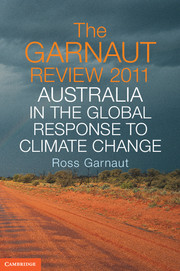Book contents
- Frontmatter
- Contents
- Preface
- Introduction
- PART I THE GLOBAL SHIFT
- Chapter 1 Beyond reasonable doubt
- Chapter 2 Carbon after the Great Crash
- Chapter 3 What's a fair share?
- Chapter 4 Pledging the future
- PART II AUSTRALIA'S PATH
- PART III AUSTRALIAN TRANSFORMATIONS
- Chapter 12 Choosing the future
- Notes
- Acknowledgments
- Index
Chapter 1 - Beyond reasonable doubt
Published online by Cambridge University Press: 05 January 2012
- Frontmatter
- Contents
- Preface
- Introduction
- PART I THE GLOBAL SHIFT
- Chapter 1 Beyond reasonable doubt
- Chapter 2 Carbon after the Great Crash
- Chapter 3 What's a fair share?
- Chapter 4 Pledging the future
- PART II AUSTRALIA'S PATH
- PART III AUSTRALIAN TRANSFORMATIONS
- Chapter 12 Choosing the future
- Notes
- Acknowledgments
- Index
Summary
The internet is a wonderful research tool. With the click of a mouse, you can beam yourself into what seems an infinite number of important lectures by eminent thinkers around the world.
Just such an opportunity awaits if you search for Richard A. Muller, professor of physics at the University of California, Berkeley. The results of such a search include a video of Professor Muller castigating the scientists at the centre of the 2009 Climategate scandal.
‘Climategate’ is the name given by sections of the American media to the 2009 imbroglio surrounding leaked emails from the Hadley Centre in the United Kingdom. The emails were used to suggest that some scientists had been selective in their use of data to support the idea of global warming. In the video, Professor Muller berates the Hadley Centre scientists for smoothing data to produce alarming graphs that would make global warming ‘incontrovertible’ to the public. Professor Muller concludes by announcing his own major study into the measurement of global warming, the Berkeley Earth Project, without ‘the bias’, he says in the video.
Some months later, in March 2011, Professor Muller appeared before a US congressional committee at the invitation of Republican members opposing action on climate change. He was there to present the preliminary results of his bias-free project. To his surprise, he said, and certainly to the surprise of his hosts, the results of the project tallied very closely with those of the Hadley Centre's temperature measurements, as well as those of the US National Aeronautics and Space Administration and the National Oceanic and Atmospheric Administration.
- Type
- Chapter
- Information
- The Garnaut Review 2011Australia in the Global Response to Climate Change, pp. 1 - 18Publisher: Cambridge University PressPrint publication year: 2011
- 2
- Cited by

